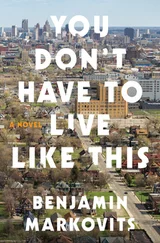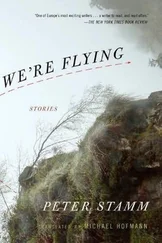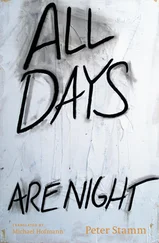She tugged at the curtain, in which Andreas had wrapped the little statue.
“Don’t,” he said, and shut the trunk.
Delphine thought she would swim before supper, to cool off. Andreas said he would have a drink meanwhile. It was not a large swimming pool, surrounded by a fence, and just a few steps from the terrace of the hotel restaurant. Andreas sat at a table at the edge of the terrace, and ordered a Ricard. It didn’t seem to bother Delphine that the diners could watch her as she climbed into the water and swam a few lengths. She came out, squeezed the water from her short hair with one hand, and dried herself. Then she wrapped herself in the towel, and came up to Andreas’s table. She sat down, and looked at the menu.
“Do you want to eat here?”
“Don’t mind.”
“Well, then, let’s go somewhere else.”
Andreas went up to the room with Delphine, and watched her as she got changed. She put on a little green skirt of rough cotton and a thin black cardigan. She went into the bathroom, and came back with pink lipstick on. Andreas had never seen her with lipstick on. He said she looked nice. He wondered what she liked about him, or what she had liked about Jean-Marc.
They walked along the main road, heading for the town center. They passed a lot of hotels, a shopping center, and roundabouts decorated with wine barrels and vines. The old center was all done up. Every other house was a restaurant or a wine cellar. Delphine wanted to look at the cathedral. The nave was dark. If you pushed a button, some lights came on that lit up the altar and one especially noteworthy chapel. Delphine lit a candle. Andreas asked who that was for. No one in particular she said, just on account.
“Now God owes me.”
“I wonder what sort of miracle you’ll get for one euro,” said Andreas.
The town was full of tourists, they choked the streets and occupied the tables of the garden restaurants. It was all too noisy and full for Andreas. Finally he said they had passed a cafeteria near the shopping center. Delphine protested, but in the end she gave in.
When they were back at the shopping center, they saw that the cafeteria was due to close in half an hour. The woman behind the counter told them they would have to hurry. They picked up a first course at the counter, and ordered the dish of the day. Delphine chose a bottle of wine.
Not many of the tables were occupied. There were a few men by themselves, a group of Japanese tourists, and a woman with her three children. She took two of them to the bathroom. The third, a boy of about seven, stayed behind on his own. He sat there very still, lost in thought. Suddenly Andreas felt enormous sympathy for him. He felt like going up to him and speaking to him or buying him an ice cream. Then the mother came back with the other two.
“Don’t you like it?” asked Delphine.
Andreas said he had been thinking about how they used to eat in restaurants like this one when he was a child.
“I could never decide what I wanted. My parents pressured me, and in the end I always ordered the wrong thing. I had been looking forward to going so much, and it was always a disappointment in the end.”
Delphine said going out to eat had always been a treat for her. It hadn’t happened often, and her mother wasn’t an especially good cook.
The hotel restaurant was shut. A group of girls were sitting in the lobby, talking in German. Presumably they were here on a school trip. They talked and laughed together loudly.
Andreas recalled the graduation trip for his class in high school. They had gone to Paris, four days of sightseeing, three nights in a cheap tourist hotel. For the first time, he remembered Paris as he found it then — not the city in which he had spent the subsequent eighteen years. It was a big city in autumn. The air was as clear as glass, and yet a strange fog seemed to hang over everything, impeding your vision, and shading the edges of what you saw. People moved a little more slowly here, as though they were in an atmosphere that was heavier than air.
Their hotel was somewhere in the northwest of the city, a part Andreas hadn’t been back to since. He remembered the name of the Metro station, La Fourche — a line divided there. Their class teacher had been nervous, and hadn’t let the boys and girls out of his sight. Only rarely had they had an hour or two for themselves, after sightseeing trips and museum visits, and before supper. Then Andreas had set out on his own, exploring the quarter in ever-widening circles.
He remembered feeling extraordinarily happy to be standing in a bistro between two men stopping off for a drink on their way home, watching youths playing pinball, and women clicking rapidly past outside the big windows. It was the freest Andreas had ever felt.
He got the map out of the car. In the room he studied the route they would be taking tomorrow. Delphine was in the bathroom. He tried to imagine her as his wife, the two of them newly married, and on their honeymoon. The fantasy both calmed and excited him.
Delphine came out of the bathroom in a short nightie of flowered terrycloth and got into bed. Andreas undressed, turned the light out, and lay down beside her. When he put his hand on her thigh, she said she would get a condom. He held her tight. What if I get pregnant, she asked. He didn’t say anything. They made love in the dark, more energetically than usual, and without exchanging a word. Then Delphine switched on the bedside lamp, and went to the bathroom. Andreas heard the faucet running, and then the flush, and then water again. When Delphine came back at last, he said they would have to be careful not to fall in love. Delphine jumped on him, and they wrestled together. She sat on his belly, and grabbed his wrists and pushed them down on the mattress.
“You are such an idiot,” she said.
He wanted to say something back, but she kissed him on the mouth, and bit his lip until he freed himself, threw her down on her back, and held her down.
“Stop it,” he said. “You’ll hurt me.”
She tried to free herself, but couldn’t. Her breath was coming hard, and she repeated that he was an idiot.
“All right,” said Andreas. “That’s enough.” Around noon the next day they crossed the border into Switzerland. During the entire drive, Delphine talked about her childhood and teen years, about the police barracks she had grown up in. She had always lived in pretty reduced circumstances, and with lots of other families with children. It had been like a big commune. All the fathers had had the same job, and the mothers were in and out of each other’s apartments, drinking coffee and chatting. When Andreas asked her if it had been a happy childhood, she hesitated.
“Sometimes happy, sometimes not. Moving was always tough. Losing my friends. It’s only a few that I met up with again, years later, in other barracks.”
The best thing had been the summer vacation, three or four weeks on the Atlantic coast.
“That was Paradise. There were always the same people there. All year, we would be out of touch, but when we arrived there, there they all were again. We were like brothers and sisters, swimming in the sea together, and playing on the beach. Those summers were never-ending. In the evenings, there were parties, people eating, drinking, dancing. All of them together. Fireworks sometimes.”
Once, there had been a forest fire, that was when she was about ten or so. The fire had approached to within a few miles of the campsite, but she hadn’t been scared.
“People assumed it was arson. For days they talked about nothing else. But I still remember thinking nothing can happen to us. No one will find us here.”
It was at the campsite that Delphine had learned to swim and surf, and this was where she fell in love for the first time as well. It had been a brief episode, and hadn’t lasted beyond the summer.
Читать дальше












